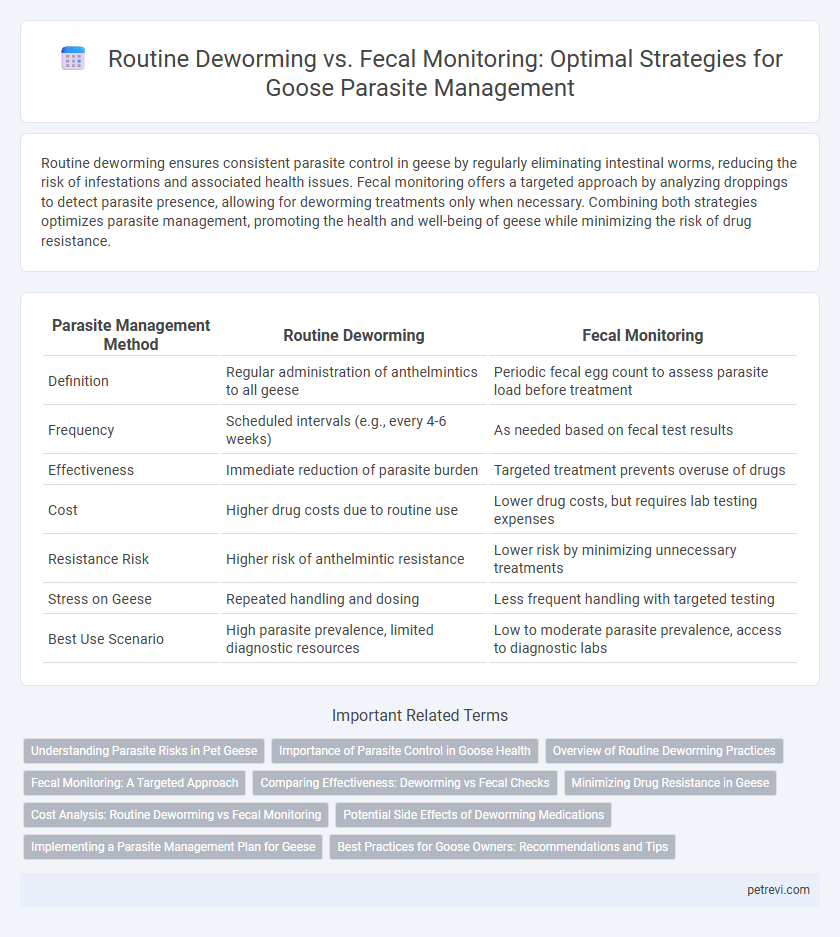Routine deworming ensures consistent parasite control in geese by regularly eliminating intestinal worms, reducing the risk of infestations and associated health issues. Fecal monitoring offers a targeted approach by analyzing droppings to detect parasite presence, allowing for deworming treatments only when necessary. Combining both strategies optimizes parasite management, promoting the health and well-being of geese while minimizing the risk of drug resistance.
Table of Comparison
| Parasite Management Method | Routine Deworming | Fecal Monitoring |
|---|---|---|
| Definition | Regular administration of anthelmintics to all geese | Periodic fecal egg count to assess parasite load before treatment |
| Frequency | Scheduled intervals (e.g., every 4-6 weeks) | As needed based on fecal test results |
| Effectiveness | Immediate reduction of parasite burden | Targeted treatment prevents overuse of drugs |
| Cost | Higher drug costs due to routine use | Lower drug costs, but requires lab testing expenses |
| Resistance Risk | Higher risk of anthelmintic resistance | Lower risk by minimizing unnecessary treatments |
| Stress on Geese | Repeated handling and dosing | Less frequent handling with targeted testing |
| Best Use Scenario | High parasite prevalence, limited diagnostic resources | Low to moderate parasite prevalence, access to diagnostic labs |
Understanding Parasite Risks in Pet Geese
Routine deworming in pet geese risks promoting parasite resistance and unnecessary medication, while fecal monitoring allows targeted treatment based on actual parasite load. Regular fecal exams identify specific parasitic infestations such as roundworms or coccidia, enabling precise interventions that improve health outcomes. Effective parasite management optimizes wellness and minimizes drug use by tailoring care to the goose's current parasite status.
Importance of Parasite Control in Goose Health
Effective parasite management is critical for maintaining optimal goose health and productivity, as gastrointestinal parasites can impair nutrient absorption and cause weight loss. Routine deworming ensures timely elimination of parasites but risks drug resistance, whereas fecal monitoring allows targeted treatment based on parasite egg counts, reducing unnecessary anthelmintic use. Implementing a balanced strategy combining fecal monitoring with strategic deworming optimizes parasite control and supports long-term flock health.
Overview of Routine Deworming Practices
Routine deworming practices for geese involve scheduled administration of anthelmintic medications to reduce parasite loads and prevent infestations. Commonly used drugs include fenbendazole and ivermectin, administered at intervals based on flock age and parasite risk factors. This approach prioritizes consistent parasite control but may increase the risk of drug resistance if not combined with monitoring strategies.
Fecal Monitoring: A Targeted Approach
Fecal monitoring offers a targeted approach to goose parasite management by analyzing fecal samples to identify specific parasite infestations, enabling precise treatment decisions. This method reduces the risk of overusing dewormers, thereby minimizing parasite resistance and promoting overall flock health. Implementing regular fecal examinations ensures timely detection and tailored interventions, enhancing parasite control efficiency in geese.
Comparing Effectiveness: Deworming vs Fecal Checks
Routine deworming in geese involves regular administration of anthelmintics to control parasite loads, ensuring consistent prevention but risking drug resistance and unnecessary treatment. Fecal monitoring offers targeted parasite management by analyzing droppings to detect infection levels, allowing precise timing for treatment and reducing chemical use. Studies indicate fecal checks can maintain health with fewer treatments, promoting sustainable parasite control and minimizing the impact on goose immunity and gut flora.
Minimizing Drug Resistance in Geese
Routine deworming in geese can lead to increased drug resistance among parasites due to constant exposure to anthelmintics, making future treatments less effective. Fecal monitoring allows targeted parasite control by identifying actual parasite burdens and only treating when necessary, reducing unnecessary drug use and slowing resistance development. Implementing fecal egg count reduction tests enhances monitoring precision, ensuring sustainable parasite management in goose populations.
Cost Analysis: Routine Deworming vs Fecal Monitoring
Routine deworming in geese entails fixed costs for anthelmintic drugs and labor regardless of parasite presence, often leading to unnecessary expenses and potential drug resistance. Fecal monitoring requires periodic diagnostic testing, which involves upfront laboratory costs but enables targeted treatments, reducing overall drug use and long-term expenses. Cost analysis reveals that fecal monitoring offers a more economical and sustainable parasite management strategy by minimizing medication costs and preserving efficacy.
Potential Side Effects of Deworming Medications
Routine deworming in geese often involves broad-spectrum anthelmintics that can cause potential side effects such as liver toxicity, altered gut flora, and reduced appetite. Fecal monitoring allows targeted treatment by identifying specific parasites, minimizing unnecessary exposure to medications and reducing the risk of drug resistance. Regular fecal exams help balance parasite control with minimizing the adverse impacts of anthelmintic drugs on goose health.
Implementing a Parasite Management Plan for Geese
Implementing a parasite management plan for geese requires balancing routine deworming with fecal monitoring to effectively control parasite loads while minimizing drug resistance. Routine deworming provides proactive parasite control but risks overuse of anthelmintics, whereas fecal egg count monitoring targets treatment based on parasite presence and intensity. Integrating fecal monitoring with strategic deworming optimizes parasite management, promotes goose health, and supports sustainable flock productivity.
Best Practices for Goose Owners: Recommendations and Tips
Routine deworming in geese involves scheduled administration of anthelmintics to prevent parasite buildup, but overuse can lead to resistance and unnecessary drug exposure. Fecal monitoring, through regular fecal egg counts, enables targeted treatment by identifying actual parasite loads, improving health outcomes and minimizing chemical use. Best practices recommend combining fecal monitoring with rotational deworming based on test results, ensuring parasite control while preserving anthelmintic efficacy and promoting overall goose well-being.
Routine deworming vs Fecal monitoring for Goose parasite management Infographic

 petrevi.com
petrevi.com